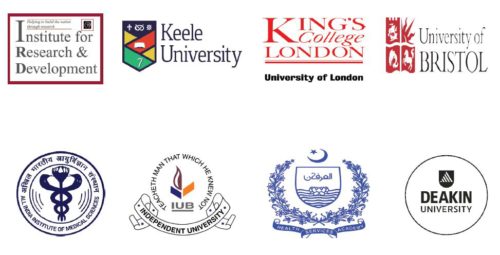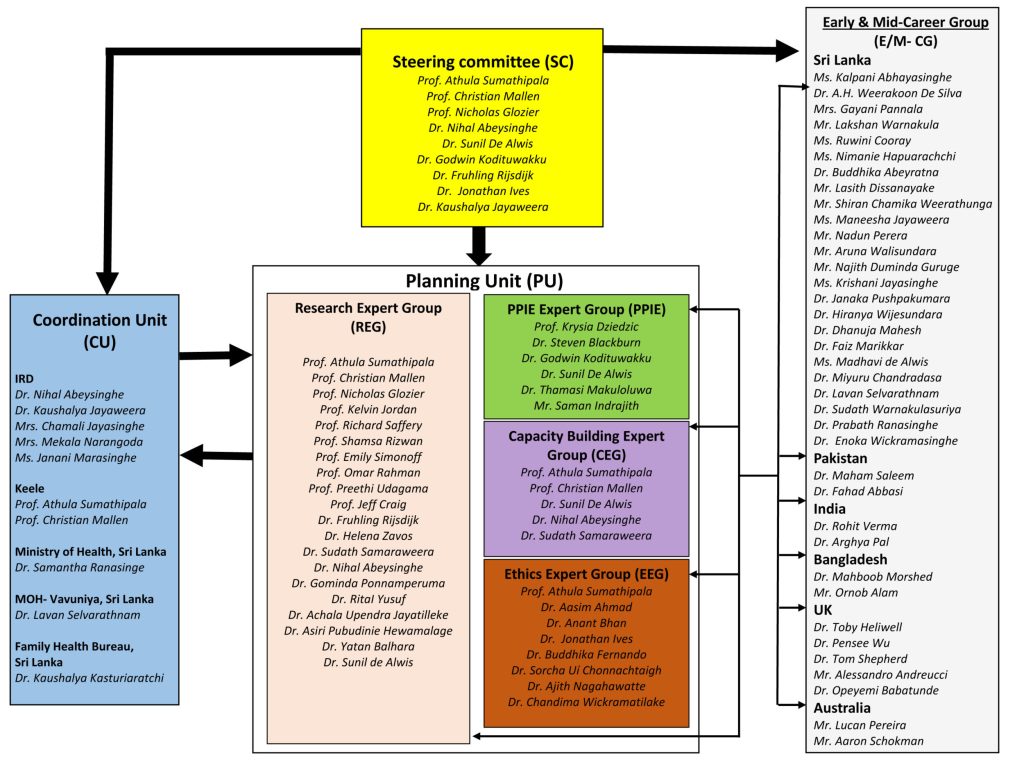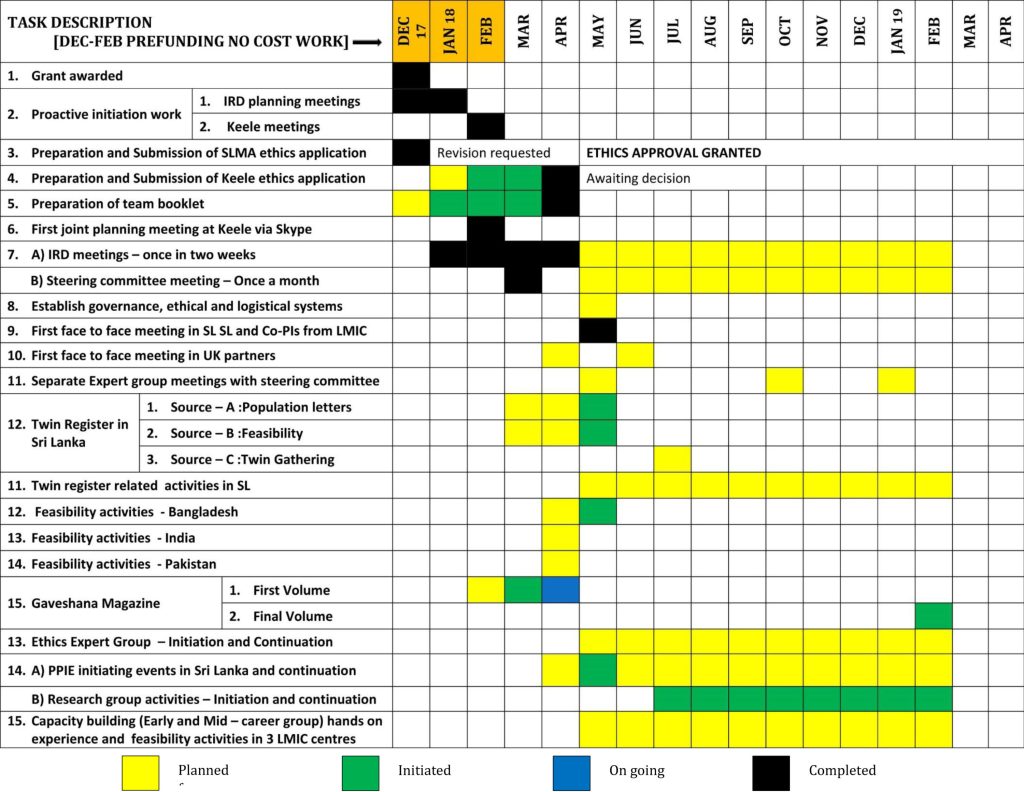The Medical Research Council of the United Kingdom (MRC-UK) launched ‘Confidence in Global Mental Health Research: Institutional “pump-priming” awards to develop new opportunities in Global Mental Health Research’ in July 2017 . Through these awards, the MRC-UK offered a one year grant opportunity to lay the grounds for future large scale, multi-disciplinary, cross-country global mental health research. The aim being to study mental health issues which are of primary relevance in low and middle income countries (LMICs). The initial focus of the MRC grant was the aetiology of mental illness and the impact of challenges to early brain development on mental health. The South Asian Early Development & Research Capacity Building Project (SEARCH) is funded through this grant.
The main focus of this project is to establish a register of infant, child and adolescent twins, and mothers pregnant with twins in Sri Lanka (the capital Colombo in the Western province and Vavuniya in the Northern Province) to be approached for future research in Sri Lanka with a long term vision is to increase the amount of research that can have an influence on health and social care in Sri Lanka and South Asia. The initial focus will be to plan research on aetiology of mental illness, the impact of challenges to early brain development on mental health, and to enhance understanding of genetic, developmental, environmental, social and cultural contributions to aetiology.
Twin studies offer a strong methodology for studying complex phenotypes and their underlying biology. The expected outputs from this project will be a sampling frame of younger twins from the Colombo (Western Province) and Vavuniya (Northern Province) districts. And a core set of data feasible to be collected from routine records on children’s health and education. Some twins will have links to parental data via the existing adult twin register. Other data (questionnaires, biometrics) will be identified through individual future projects.
We will work towards establishing a virtual center of excellence on cohort studies (following up a large group of persons to conduct research).
The initiative will be underpinned by three pillars:
We plan to develop at least two proposals within the year for further in-depth research and funding. We will decide on the key research questions guided by the research gaps, data gathered during the first year and discussion with patients and public. To achieve this goal we have assembled world leading researchers in mental health, research methods, ethics, patient and public involvement and engagement (PPIE), and grant development. Strengthening the ethics framework within the initiative is of paramount, and ethics guidelines developed previously by the IRD will be revised. PPIE is a relatively novel concept to South Asia. Evidence from the UK demonstrates that the quality of research is better and the likelihood of successful recruitment and implementation of the findings is improved when patients and the public are involved in research. We aim to establish a culture of PPIE in Sri Lanka, working with both academic colleagues and lay members; in this instance specifically with twins and their parents.
Finally research on twins will have several advantages over studying non-twin people since it is possible to study the similarities and differences of identical and non-identical twins in order to understand the relative contribution of genetics and the environment.
Our vision is to increase the impact-full research volume in Sri Lanka and South Asia by establishing a virtual center of excellence for cohort studies.
Our mission is to conduct multi-disciplinary research, work with people who benefit from research, establish strategic partnerships and work for policy impact.
(I). Expand the health and social care research arena
To extend the health and social care research carried out in Sri Lanka, in partnership with the Institute for Research and Development (IRD –www.ird.lk). In particular, from adult twin studies (which use a population based Sri Lankan Twin Registry – SLT R), to child and adolescent twin studies with the aim of identifying research themes and questions focusing on aetiology of mental illness and the impact of challenges to early brain development on mental health, taking a strategic life course approach.
(II). Expand Capacity Building Activities
We will expand ongoing capacity building activities in child and adolescent mental health (CAMH), twin methods, genetic research and ethics, through existing North-South (N-S) and South-South (S-S) collaborations.
Capacity building of junior academics across the partnership will develop future research leaders and essential skills on child and adolescent mental health, twin methods, and essential skills in all three pillars. We will bring together senior researchers from the partner organisations and form the planning and coordinating units, the steering committee, and the research, ethics and PPIE expert groups to organise these activities.
(III). Establish the register of infant, child and adolescent twins and mothers pregnant with twins
We have established a population-based adult register of 9,500 twin pairs and successfully carried out two waves of studies, in addition we have recruited a matched non-twin population based cohort of 2311 during the first wave and established a bio-bank (serum and DNA) housed in a, state- of- the art genetic laboratory.
Through this grant, we plan to take the initial steps, to establish a register of infant, child and adolescent twins and mothers pregnant with twins in Sri Lanka (the capital Colombo in the Western province and Vavuniya in the Northern Province). Once the register is developed, our research will start exploring what causes mental illness; the impact of early brain development and the role of genetic, developmental, environmental, social and cultural contributions on the origin of mental disease. Research on twins has several advantages over studying non-twin people since it is possible to study the similarities and differences of identical and non-identical twins in order to understand the relative contribution of genetics and the environment.
The overall objective of the SEARCH project is to establish a register of infant, child and adolescent twins in the Colombo (Western Province) and the Vavuniya Districts (Northern Province) of Sri Lanka, with consent from twins or parents to be approached for future research projects.
This will provide the platform to investigate the aetiology of mental illness and the impact of challenges to early brain development. We will expand existing research capacity-building activities on child and adolescent mental health, twin methods, further consolidate existing partnerships and establish new
collaborations.
(1) The initiative is underpinned by developing the three pillars;To establish governance, ethical and logistical systems for the creation of the infant, child and adolescent twin data base register in the Colombo and the Vavuniya districts
(2) Initiate exploratory activities in Sri Lanka to generate preliminary information needed to develop future applications, and continue to gather information on twin and mothers pregnant with twins in the two districts and encourage them to register with the data base.
(3) Initiation of PPIE work in Sri Lanka. We will plan to organise a high profile event by involving celebrities and leading professionals who are twins/ have twin children. We will also use the IRD tri-lingual magazine Gaveshana (the explorer) which promotes health and social care research and ethics among school children, and parents to promote PPIE activities.
(4) Initiate small scale exploratory activities in India, Pakistan and Bangladesh
(5) Develop two grant proposals, taking into consideration research gaps in child and adolescent mental health research and submit within the year
(6) Initiating twin research specific capacity building process at Keele and LMIC, through an introductory course on twin methods and advanced course at Kings College, further strengthening the early and mid-career capacity enhancement by offering the opportunity to work with expert groups


